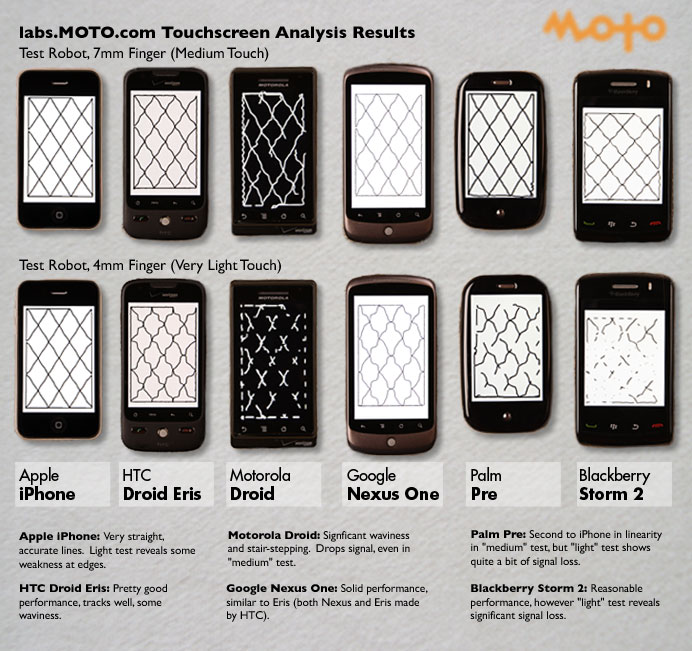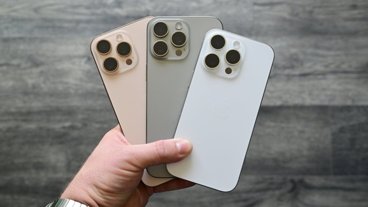The test, conducted by MOTO Labs, compared an iPhone using the SimpleDraw application with a number of other touchscreen smartphones: Google Nexus One, Motorola Droid, Palm Pre, HTC Droid Eris, and BlackBerry Storm 2. As the company, which has no relation to Motorola, discovered earlier this year, the iPhone is in first, followed by the Google Nexus One in a distant second place.
The test was done with both a 7mm robotic "finger," for a "medium touch," and a 4mm robotic finger to represent a "very light" touch. In both tests, the iPhone was found to have straight and accurate lines, with some weaknesses at the edge of the panel with the light touch.
In second was the Nexus One, which MOTO said had "solid performance" much like the Droid Eris, also manufactured by HTC. Both handsets were also specifically named in Apple's patent lawsuit against HTC filed early this month. Apple has accused HTC of "stealing" its patented iPhone technologies, which include touchscreen capabilities.
Both the Palm Pre and BlackBerry Storm 2 performed well in the medium test, but produced significant signal loss when the very light touch was employed.
The poorest performer of the bunch was the Motorola Droid, which featured "significant waviness and stair-stepping," even with the medium touch test. In the light touch, signal drops were extremely common.
MOTO noted that the touch panel alone does not make a good phone — it must perform well in combination with the phone's operating system to ensure responsiveness for the user. With that, the labs said they do not expect such a high level of variation to exist in future smartphones.
"We know for a fact that the solutions in these phones (other than the iPhone) are all last-generation silicon and touch panel components — the other touch screen makers are hard at work perfecting their new solutions, and they may just leapfrog Apple in some areas when they arrive on the market over the next year," the report said.
 Katie Marsal
Katie Marsal







-m.jpg)






 Charles Martin
Charles Martin
 Wesley Hilliard
Wesley Hilliard
 Stephen Silver
Stephen Silver
 William Gallagher
William Gallagher

 Marko Zivkovic
Marko Zivkovic
 Andrew Orr
Andrew Orr
 Amber Neely
Amber Neely








130 Comments
I agree.
And with my Power Support non- glare film cover, as applied by an Apple store employee himself, it's even better.
We already knew this.
Except Apple isn't stopping iPhone development. Oops.
No wonder the DROID hype has turned cold like a stale bread. Storm of course went out more like a drizzle. The rest are just copycats.
They will never leapfrog over Apple, because Apple has at least 2yrs advancement and refinement over all of them. It will only get better with time.
iPhone rules. Time will come when will take over 50% of the smartphone market. It will take time, but it sure will happen.
keep copying, guys...you're getting close to the iphone...
Yes we all knew this, but what remains to be seen is how accurate the iPad's touchscreen will be.
A problem with touchscreens is the stylus is a big, fat, greasy, gets in the way, finger, lacking the fine pixel level control a cursor point provides.
What would be very interesting to see if the iPad will respond to the detail a stylus provides, and if very positive, then the iPad would make a very interesting device for sketch artists.
If it accepts very detailed and multiple input, then perhaps a whole new breed of paint brushes will appear to mimic real ones and one can just naturally paint too.
Also to see if a mouse/cursor/walcom will work with the iPad, it already has a optional physical keyboard.
Talk about trying to turn the iPad back into a real computer.